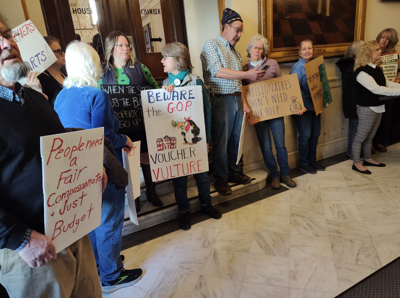Eliminating an income-eligibility cap on families that can receive taxpayer-paid Education Freedom Accounts cleared its final hurdle in the House of Representatives Thursday. The 188-181 vote on the bill ( HB 115 ) hardly settles the issue, however, given that the Senate has its own bill ( SB 295 ) on the topic and Gov. Kelly Ayotte has a position that would be less costly than either version.
The vote does reflect the strong support for school choice among the House GOP base. The vote gave at least an annual $16 million increase to a 3-year-old program on the same day the House was giving virtually every state agency a haircut while crafting its two-year state budget. “Students should never be turned away from education options because of their options or their ability to pay,” said state Rep.

Valerie McDonnell, R-Salem. The program has grown by 2,000% since its first cost estimate of $350,000 that grew to $28 million in the current year, said Rep. Kate Murray, D-New Castle.
“Most of these vouchers are nothing more than taxpayer-provided grants to families who are already wealthy enough to send their children to private school,” Murray said. “At a time when we are cutting every single state program, this is not the time to expand a program that is so costly and so unpopular except for a minority segment of people.” The House bill that won final approval Thursday would raise the income limit next school year to 400% of the federal poverty level before eliminating the income limit entirely in 2026-27.
Under the current 350% limit, a family of four can earn up to $103,600 and still qualify. The 400% limit would raise it to $128,600. Over the three months since this issue has been fought over in the House, opponents have picked up only one vote.
Last month, the Senate passed along a party line 16-8 vote for its bill from first-term Sen. Victoria Sullivan, R-Manchester. Her bill, as amended, would eliminate the income limit but cap at 10,000 the number of EFAs given out every year.
Currently, just over 5,200 families make use of the EFA grants, which can be used toward tuition or expenses for private, religious, alternative public or home school. The average EFA is worth about $5,100 In her state budget message last month, Ayotte called for more modest legislation that would permit a family of any income to get an EFA grant, but only if their child was currently enrolled in a public school. Studies have confirmed that relatively few EFA grants have gone to families who used the money to take their child out of a public school.
One analysis found 85% of EFAs had gone to religious schools and more than three in four went to parents who already had their child enrolled in a non-public school. To buttress its position, the House also attached its EFA plan into the budget trailer bill (HB 2) it also sent to the State Senate. What’s Next : The House and Senate committees will each be holding public hearings in the coming weeks on the competing versions of this topic coming from the other branch.
Sullivan's Senate bill faces a public hearing next Wednesday. Prospects : Something is likely to pass but details are unclear. The solution may become part of a final state budget compromise that lawmakers take up at the end of the legislative session.
[email protected].
Politics

House puts forward its version of EFA expansion

Eliminating an income-eligibility cap on families that can receive taxpayer-paid Education Freedom Accounts cleared its final hurdle in the House of Representatives Thursday.















